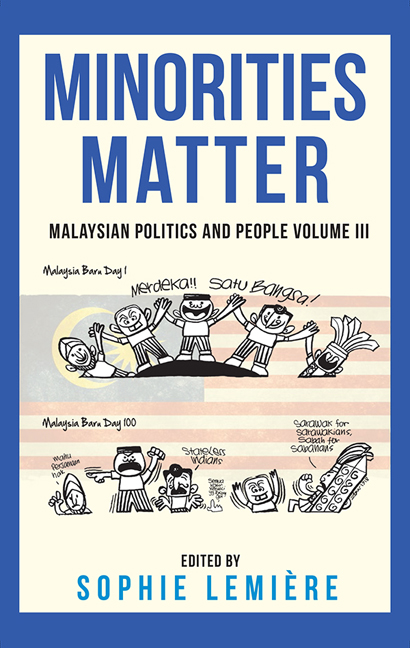Book contents
- Frontmatter
- Contents
- Acknowledgements
- Foreword
- Introduction
- Part I Engaging Politics: The Role of Minorities in GE14 and Beyond
- 1 Local Elections, Decentralisation, and Institutional Reform
- 2 ‘Where's Our #30peratus’: A Feminist Critical Discourse Analysis of Twitter Debates on Women's Political Representation
- 3 Romantic Whispers: When Relationships Mobilise Political Agency in the Sabah Elections
- 4 The Orang Asli in GE14: Towards Meaningful Political Engagement?
- 5 The 1963 Malaysia Agreement (MA63): Sabah and Sarawak and the Politics of Historical Grievances
- Part II Building Democracy: Malaysia Baru and the (Im-)possible Reform
- List of Contributors
3 - Romantic Whispers: When Relationships Mobilise Political Agency in the Sabah Elections
from Part I - Engaging Politics: The Role of Minorities in GE14 and Beyond
Published online by Cambridge University Press: 25 January 2020
- Frontmatter
- Contents
- Acknowledgements
- Foreword
- Introduction
- Part I Engaging Politics: The Role of Minorities in GE14 and Beyond
- 1 Local Elections, Decentralisation, and Institutional Reform
- 2 ‘Where's Our #30peratus’: A Feminist Critical Discourse Analysis of Twitter Debates on Women's Political Representation
- 3 Romantic Whispers: When Relationships Mobilise Political Agency in the Sabah Elections
- 4 The Orang Asli in GE14: Towards Meaningful Political Engagement?
- 5 The 1963 Malaysia Agreement (MA63): Sabah and Sarawak and the Politics of Historical Grievances
- Part II Building Democracy: Malaysia Baru and the (Im-)possible Reform
- List of Contributors
Summary
Sabah, Malaysia, is home to an estimated two million irregular migrants, a large number having arrived from the Philippines. Since the 1970s, thousands have migrated every year through porous sea borders, increasing their numbers exponentially. The Malaysian government responds to the presence of irregular migrants with policies of detention and deportation, impacting the way marriages and relationships are experienced by those repatriated. This chapter delves into the lives of irregular female migrants impacted by these policies, many of whom have begun romantic relationships with local Sabah men. The lives these women lead are indeed arduous; from the separation of having to send their children back to the Philippines to avoid on-going arrests, to working long inhumane hours in the informal industries at restaurants and factories. Thus they see their relationship with their Sabah partners as providing respite and comfort. Data show that, leading up to the GE14, these women began to experience a newfound feeling of hope through their partners, all of whom were galvanised to vote for change. For these women, their identities have always been framed within the context of survival and suffering; they try to mimic stability whilst accepting a life of on-going disprivilege and judgement. In an attempt to impact the election and change an administration of abuse and corruption, irregular migrant women tried to coerce their partner to vote differently from the past. Ultimately, the participants of this chapter hoped to find new ways to affect the electorate enough to lead to a possible life of normalcy and stability whilst expanding the informal discourse of political agency.
Introduction
It was a quiet night for the popular pub located at Api-Api centre in the heart of Kota Kinabalu, Sabah. While it isn't uncommon to openly have a beer at six in the evening, it didn't seem like much of a norm that Wednesday evening in May 2018. It seemed as though most Sabahans were too engrossed with the on-going political campaign leading up to the 14th general election to be in the bars. ‘These days they come in much later because you need to be sober to keep up with the drama,’ jokes Liberty, a 36-year-old Visayan bar hostess as she touched up her lipstick. Her observations of the local political scene have always been sharp.
- Type
- Chapter
- Information
- Minorities MatterMalaysian Politics and People Volume III, pp. 36 - 51Publisher: ISEAS–Yusof Ishak InstitutePrint publication year: 2019

